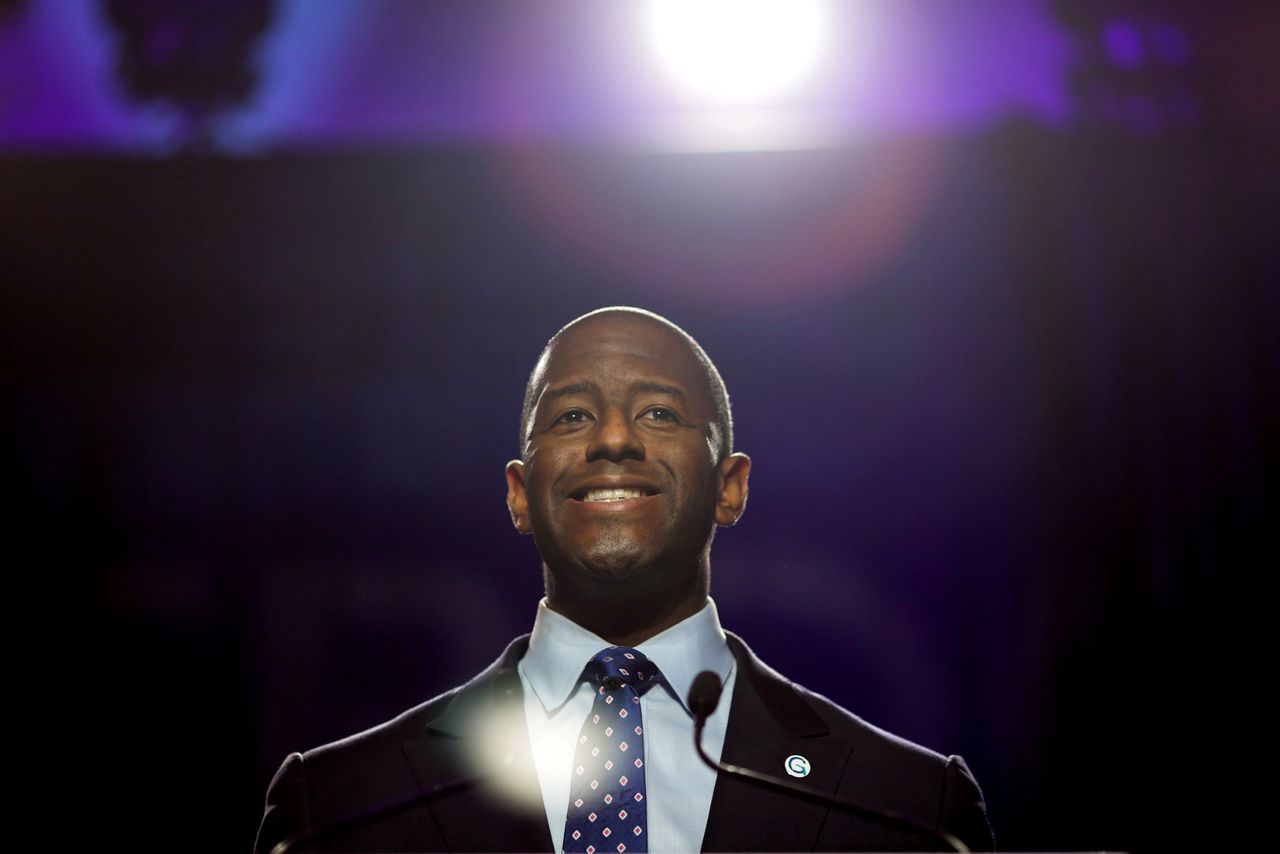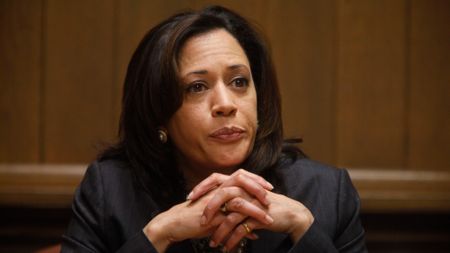Andrew Gillum, Martha McSally, and the lessons of Tuesday's primaries
Can Democrats learn from Andrew Gillum's surprising triumph in Florida?


There are two worthwhile takeaways from Tuesday's primary elections. One is that despite the best efforts of its leadership in Congress, the Democratic Party could become a viable force in national politics again. The other is that the recent conviction of Paul Manafort, the guilty pleas of Michael Cohen, and countless other scandals related to President Trump and his administration are of very little interest to many voters.
Even as his administration descends ever further into the hell of palace gossip, it is clear that President Trump enjoys very wide support among the Republican base. This was clear not least of all in Arizona, the home state of the late Sen. John McCain, where voters were faced with selecting candidates to run for the seat being vacated by GOP Sen. Jeff Flake. McCain, Flake, and Sen. Bob Corker of Tennessee have been the president's three most prominent Republican critics in the upper chamber. In a three-way race involving a deranged ex-sheriff convicted of contempt of court and pardoned by the president in August 2017 and a state senator who thought that jokes about the disease from which McCain died were a good way to highlight her opposition to "political correctness" within two days of the man's death, voters chose to endorse Rep. Martha McSally, a sitting congresswoman who ran on a pro-Trump, anti-immigration platform. Some cynical critics will surely suggest that Arpaio's loss is Trump's too, but this is nonsense. Indeed, hours before polls closed the president had already taken to Twitter to congratulate McSally on her then-hypothetical victory and mock Flake.
Meanwhile in Florida, a state in which governor and senator seem to be interchangeable, quasi-lifetime appointments regardless of one's party, outgoing Gov. Rick Scott (R) was nominated to run against Democratic Sen. Bill Nelson. Even Scott, a popular and relatively moderate two-term governor, sought and received an endorsement from the president, as did his victorious counterpart in the gubernatorial race, Ron DeSantis. In Oklahoma, Kevin Stitt, a relatively unknown Tulsa businessman, beat Mayor Mick Cornett of Oklahoma City after a campaign in which he relentlessly accused his opponent of being insufficiently supportive of Trump. Neither of these men is even going to Washington.
Subscribe to The Week
Escape your echo chamber. Get the facts behind the news, plus analysis from multiple perspectives.

Sign up for The Week's Free Newsletters
From our morning news briefing to a weekly Good News Newsletter, get the best of The Week delivered directly to your inbox.
From our morning news briefing to a weekly Good News Newsletter, get the best of The Week delivered directly to your inbox.
But the most significant thing about the current cycle of primaries is not how they became a kind of Miss Trump 2018 contest for Republicans, but how in Florida and Arizona Democrats chose to ignore the president and run on questions that actually affect voters' lives. In both states the most prominent theme in television advertising was health care, a bread-and-butter issue that the president and his party have largely ignored since various bills attempting to repeal or modify the Affordable Care Act failed last year. Mayor Andrew Gillum of Tallahassee, who had polled near the 16 percent mark before Tuesday, beat his Clintonite rival in the governor's race after promising to support single-payer health care and a $15 minimum wage. Gillum, the first African-American candidate to win a party gubernatorial contest in Florida, began his campaign with calls for Trump's impeachment but seems to have pivoted away from criticism of the president in favor of focusing on his own policy agenda.
What this suggests, whether they care to admit it or not, is that Democrats recognize it is impossible to win a statewide election in many parts of the country without securing the votes of at least some of the president's supporters. Just as Barack Obama continued to enjoy the almost universal support of his base even as dissatisfaction with aspects of his would-be signature domestic legislation mounted, it is possible to imagine that voters might be personally fond of, or at least not absolutely disgusted with, Trump even as they question whether he is improving their well-being and those of their families.
Does this mean that Democrats are getting smarter? I am slapping myself as I type these words.
It is still far too early to make any serious predictions about who the Democratic candidate in 2020 will be or how he or she will run their campaign. But the central lesson of 2016 was, surely, that it is impossible to win solely by running against Trump. Hillary Clinton lost to the least probable candidate in the history of American presidential elections because she conceded every aspect of the race, from media coverage to the national debate stage to her own party's messaging, to her opponent. Job creation schemes were ignored and education policy talking points went unread on her website as she went on national television to read aloud from random anime Nazi Twitter accounts in the hope of arguing that Trump had "mainstreamed" an online political movement of which the vast majority of Americans had never heard.
At this point there is not a single living American who has not made up his or her mind one way or the other about our president. There are no more votes to be gotten by reminding us of his crass manners, his unstable temperament, or his legal woes — and even if there were, no one is better at doing it than the man himself. People need things to vote for, not just candidates to vote against. The political future will belong to Democrats who understand this.
Sign up for Today's Best Articles in your inbox
A free daily email with the biggest news stories of the day – and the best features from TheWeek.com
Matthew Walther is a national correspondent at The Week. His work has also appeared in First Things, The Spectator of London, The Catholic Herald, National Review, and other publications. He is currently writing a biography of the Rev. Montague Summers. He is also a Robert Novak Journalism Fellow.
-
 Rep. Sylvester Turner dies, weeks after joining House
Rep. Sylvester Turner dies, weeks after joining HouseSpeed Read The former Houston mayor and longtime state legislator left behind a final message for Trump: 'Don't mess with Medicaid'
By Peter Weber, The Week US Published
-
 Trump pauses Ukraine intelligence sharing
Trump pauses Ukraine intelligence sharingSpeed Read The decision is intended to pressure Ukrainian President Volodymyr Zelenskyy into peace negotiations with Vladimir Putin
By Peter Weber, The Week US Published
-
 Supreme Court rules against Trump on aid freeze
Supreme Court rules against Trump on aid freezeSpeed Read The court rejected the president's request to freeze nearly $2 billion in payments for foreign humanitarian work
By Rafi Schwartz, The Week US Published
-
 'Seriously, not literally': how should the world take Donald Trump?
'Seriously, not literally': how should the world take Donald Trump?Today's big question White House rhetoric and reality look likely to become increasingly blurred
By Sorcha Bradley, The Week UK Published
-
 Will Trump's 'madman' strategy pay off?
Will Trump's 'madman' strategy pay off?Today's Big Question Incoming US president likes to seem unpredictable but, this time round, world leaders could be wise to his playbook
By Sorcha Bradley, The Week UK Published
-
 Democrats vs. Republicans: who are the billionaires backing?
Democrats vs. Republicans: who are the billionaires backing?The Explainer Younger tech titans join 'boys' club throwing money and support' behind President Trump, while older plutocrats quietly rebuke new administration
By Harriet Marsden, The Week UK Published
-
 US election: where things stand with one week to go
US election: where things stand with one week to goThe Explainer Harris' lead in the polls has been narrowing in Trump's favour, but her campaign remains 'cautiously optimistic'
By Harriet Marsden, The Week UK Published
-
 Is Trump okay?
Is Trump okay?Today's Big Question Former president's mental fitness and alleged cognitive decline firmly back in the spotlight after 'bizarre' town hall event
By Harriet Marsden, The Week UK Published
-
 The life and times of Kamala Harris
The life and times of Kamala HarrisThe Explainer The vice-president is narrowly leading the race to become the next US president. How did she get to where she is now?
By The Week UK Published
-
 Will 'weirdly civil' VP debate move dial in US election?
Will 'weirdly civil' VP debate move dial in US election?Today's Big Question 'Diametrically opposed' candidates showed 'a lot of commonality' on some issues, but offered competing visions for America's future and democracy
By Harriet Marsden, The Week UK Published
-
 1 of 6 'Trump Train' drivers liable in Biden bus blockade
1 of 6 'Trump Train' drivers liable in Biden bus blockadeSpeed Read Only one of the accused was found liable in the case concerning the deliberate slowing of a 2020 Biden campaign bus
By Peter Weber, The Week US Published